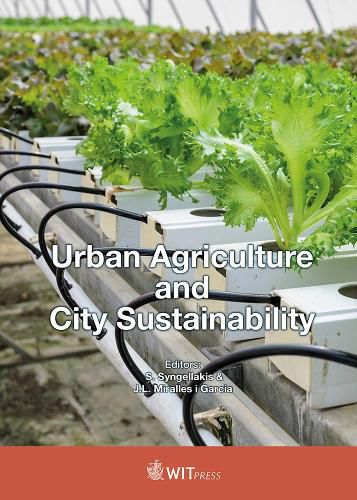Readings Newsletter
Become a Readings Member to make your shopping experience even easier.
Sign in or sign up for free!
You’re not far away from qualifying for FREE standard shipping within Australia
You’ve qualified for FREE standard shipping within Australia
The cart is loading…






This title is printed to order. This book may have been self-published. If so, we cannot guarantee the quality of the content. In the main most books will have gone through the editing process however some may not. We therefore suggest that you be aware of this before ordering this book. If in doubt check either the author or publisher’s details as we are unable to accept any returns unless they are faulty. Please contact us if you have any questions.
Selected paper presented at the 1st International Conference on Urban Agriculture and City Sustainability are contained in this book. The research reviews ways in which urban agriculture can contribute to achieve sustainable cities and considers ways of reducing the impact in terms of use of natural resources, waste production and climate change.
The increasing number of people in cities requires new strategies to supply the necessary food with limited provision of land and decreasing resources. This will become more challenging unless innovative solutions for growing and distributing food in urban environments are considered.
The scale of modern food production has created and exacerbated many vulnerabilities and the feeding of cities is now infinitely more complex. As such the food system cannot be considered secure, ethical or sustainable.
In the last few years there has been a rapid expansion in initiatives and projects exploring innovative methods and processes for sustainable food production. The majority of these projects are focused on providing alternative models that shift the power back from the global food system to communities and farmers improving social cohesion, health and wellbeing. It is therefore not surprising that more people are looking towards urban farming initiatives as a potential solution.
These initiatives have demonstrated that urban agriculture has the potential to transform our living environment towards ecologically sustainable and healthy cities. Urban agriculture can also contribute to energy, natural resources, land and water savings, ecological diversity and urban management cost reductions.
The impact urban agriculture can have on the shape and form of our cities has never been fully addressed. The studies included in this volume look at how cities embed these new approaches and initiatives, as part of new urban developments and show that a city regeneration strategy is critical.
$9.00 standard shipping within Australia
FREE standard shipping within Australia for orders over $100.00
Express & International shipping calculated at checkout
This title is printed to order. This book may have been self-published. If so, we cannot guarantee the quality of the content. In the main most books will have gone through the editing process however some may not. We therefore suggest that you be aware of this before ordering this book. If in doubt check either the author or publisher’s details as we are unable to accept any returns unless they are faulty. Please contact us if you have any questions.
Selected paper presented at the 1st International Conference on Urban Agriculture and City Sustainability are contained in this book. The research reviews ways in which urban agriculture can contribute to achieve sustainable cities and considers ways of reducing the impact in terms of use of natural resources, waste production and climate change.
The increasing number of people in cities requires new strategies to supply the necessary food with limited provision of land and decreasing resources. This will become more challenging unless innovative solutions for growing and distributing food in urban environments are considered.
The scale of modern food production has created and exacerbated many vulnerabilities and the feeding of cities is now infinitely more complex. As such the food system cannot be considered secure, ethical or sustainable.
In the last few years there has been a rapid expansion in initiatives and projects exploring innovative methods and processes for sustainable food production. The majority of these projects are focused on providing alternative models that shift the power back from the global food system to communities and farmers improving social cohesion, health and wellbeing. It is therefore not surprising that more people are looking towards urban farming initiatives as a potential solution.
These initiatives have demonstrated that urban agriculture has the potential to transform our living environment towards ecologically sustainable and healthy cities. Urban agriculture can also contribute to energy, natural resources, land and water savings, ecological diversity and urban management cost reductions.
The impact urban agriculture can have on the shape and form of our cities has never been fully addressed. The studies included in this volume look at how cities embed these new approaches and initiatives, as part of new urban developments and show that a city regeneration strategy is critical.